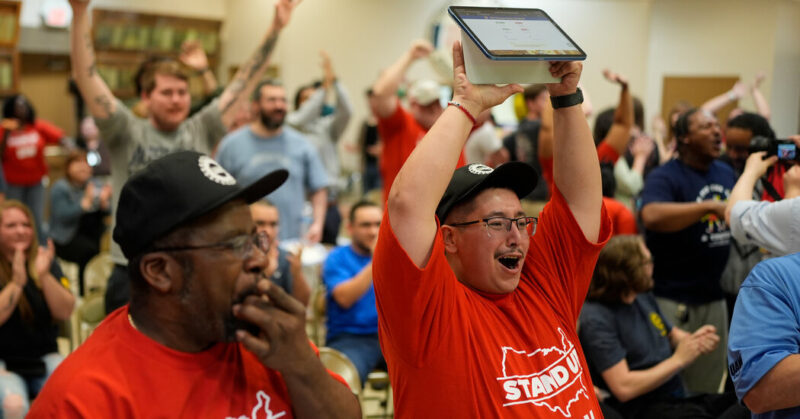In a landmark victory for organized labor, workers at a Volkswagen plant in Tennessee have voted overwhelmingly to join the United Automobile Workers union, becoming the first nonunion auto plant in a Southern state to do so.
The company said in a statement late Friday that the union had won 2,628 votes, with 985 opposed, in a three-day election. Two earlier bids by the U.A.W. to organize the Chattanooga factory over the last 10 years were narrowly defeated.
The outcome is a breakthrough for the labor movement in a region where anti-union sentiment has been strong for decades. And it comes six months after the U.A.W. won record wage gains and improved benefits in negotiations with the Detroit automakers.
The U.A.W. has for more than 80 years represented workers employed by General Motors, Ford Motor and Stellantis, the producer of Chrysler, Jeep, Ram and Dodge vehicles, and has organized some heavy-truck and bus factories in the South.
But the union had failed in previous attempts to organize any of the two dozen automobile factories owned by other companies across an area stretching from South Carolina to Texas and as far north as Ohio and Indiana.
With the victory in Chattanooga, the U.A.W. will turn its focus to other Southern plants. A vote will take place in mid-May at a Mercedes-Benz plant in Vance, Ala., near Tuscaloosa. The U.A.W. is hoping to organize a half-dozen or more plants over the next two years.
“Tonight you all together have taken a giant, historic step,” Shawn Fain, the president of the U.A.W., said at a celebratory gathering in Chattanooga. “Tonight we celebrate this historic moment in our nation’s and our union’s history. Let’s get to it and go to work and win more for the working class of this nation.”
A string of victories for the U.A.W. could have profound effects for Southern auto workers and the broader auto industry. Nonunion auto workers typically earn significantly lower wages than those in U.A.W.-represented plants, and collective bargaining could bring them substantial increases in pay, benefits and job security.
“Volkswagen workers will have a chance for better pay and working conditions under a collective bargaining agreement,” said Arthur Wheaton, director of labor studies at Cornell University School of Industrial and Labor Relations. “They’ll have a lot of job protections under a union contract that they don’t have now.”
At G.M., Ford and Stellantis, any layoffs have to be planned with advance notice to the union, and workers get supplemented unemployment benefits. Nonunion plants don’t have to take such measures.
A large U.A.W. presence in the South would also upset an automotive landscape in which U.A.W. contracts have left G.M., Ford and Stellantis with higher labor costs than nonunion rivals like Toyota, Honda, Nissan, Tesla and Hyundai.
“This is a watershed moment for the industry,” said Harley Shaiken, a professor emeritus at the University of California, Berkeley, who has followed the U.A.W. for more than three decades. “It sets an example that would resonate across the industry, and across other industries where there’s a large presence of nonunion workers.”
The U.A.W.’s success in the negotiations with the Big Three in the fall set off a surge in interest among Southern autoworkers in organizing their own plants, the union said, and prompted the U.A.W. to kick off a $40 million effort to support them.
Volkswagen workers who voted in favor of U.A.W. representation said they hoped the union would help them win higher wages and more paid time off. The Chattanooga factory currently pays a top wage of about $35 an hour, compared with the top wage of more than $40 an hour that G.M., Ford and Stellantis now pay U.A.W. workers.
The U.A.W. contracts also provide health care coverage that is almost entirely paid by the companies, substantial profit-sharing bonuses, cost-of-living adjustments to insulate workers from inflation and generous retirement programs.
Among those voting for the U.A.W. in Chattanooga was Tony Akridge, 48, who is in his second year at the VW plant, working on motors and transmissions on the night shift. His $23 hourly wage exceeded what he earned in previous jobs, he said, but he voted for the U.A.W. in hopes that the union could help improve workers’ living standards.
“It gives us a better opportunity,” Mr. Akridge said. “They pay us OK, but it’s not good enough for the things they need done. Noting the rising cost of living, he added that the union “will get better benefits toward that, making life just a little bit more easy.”
Others are counting on U.A.W. representation to bring more paid time off. Most VW workers must either take unpaid time off when the plant shuts down in the summer and around the holidays, or use paid time off to cover those periods. If they do, many are left with only a few days to cover any sick days or family leave the rest of the year, workers said.
“We’re forced to use our P.T.O. a lot instead of using it on our own terms sometimes,” said Craig Jackson, 56, who voted for the union.
At the Detroit automakers, U.A.W. workers get up to five weeks of vacation and 19 paid holidays, and are allowed two weeks for parental leave.
Workers who opposed the union at VW said they were unsure what gains the U.A.W. could bring them.
“You really don’t have any kind of guarantee with them,” said Darrell Belcher, 54, who has worked on the assembly floor for 13 years and voted against the U.A.W. in the two previous elections at the plant. “I’m not saying we won’t gain anything, but we are probably going to lose something just to gain it.”
As the voting was about to start, the governors of Alabama, Georgia, Tennessee, Mississippi, South Carolina, and Texas — all Republicans — issued a statement on Tuesday saying unionizing would jeopardize auto jobs in their states.
“We want to keep good-paying jobs and continue to grow the American auto manufacturing sector here,” the governors said. “A successful unionization drive will stop this growth in its tracks, to the detriment of American workers.”
But even some VW workers who opposed the U.A.W. said they did not think union representation would endanger the Chattanooga plant. “I do not feel that the plant will leave Chattanooga or the South,” said Cody Rose, 34, a 13-year veteran of the plant who works in body shop production. “Volkswagen has too much invested in this area.”
The Chattanooga plant opened in 2011, and employs 5,500 people, of whom about 4,300 were eligible to vote in the union election. The plant produces the VW Atlas, a large sport utility vehicle, and an electric vehicle, the ID.4. It is Volkswagen’s only plant in the United States, and was the only VW plant in the world that was not unionized.
The U.A.W. had some advantages in winning support at Volkswagen. Its effort had the support of IG Metall, the powerful union that represents autoworkers in Germany. German companies also have a strong tradition of giving workers a voice. Under German law, worker representatives must hold half the seats on a company’s supervisory board, the equivalent of a board of directors.
The U.A.W. can now turn its attention to the Mercedes plant in Alabama, which employs about 6,100 people. The union tried to organize that plant once before, but the effort died out before coming to a vote.
Jamie McGee contributed reporting.








